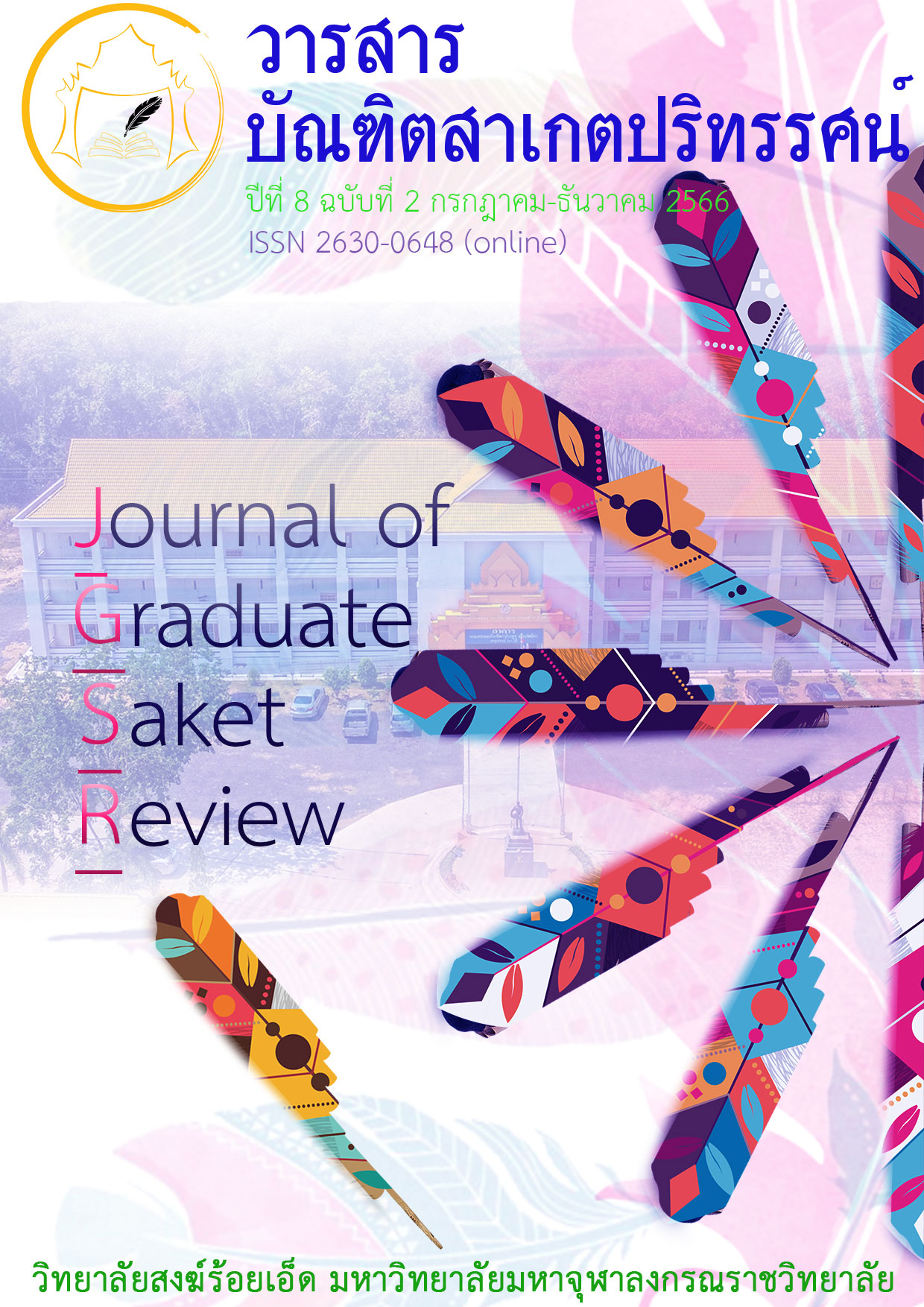การพัฒนาการจัดการเรียนรู้โดยใช้แนวปฏิบัติการสอน 5 ขั้น ร่วมกับงานทางคณิตศาสตร์ เรื่อง สถิติ ที่ส่งเสริมทักษะการให้เหตุผลเชิงสถิติ ของนักเรียนชั้นมัธยมศึกษาปีที่ 1
Main Article Content
บทคัดย่อ
การวิจัยครั้งนี้มีวัตถุประสงค์ เพื่อศึกษาแนวการจัดการเรียนรู้โดยใช้แนวปฏิบัติการสอน 5 ขั้น ร่วมกับงานทางคณิตศาสตร์ และศึกษาผลการจัดการเรียนรู้โดยใช้แนวปฏิบัติการสอน 5 ขั้น ร่วมกับงานทางคณิตศาสตร์ เรื่อง สถิติ ที่ส่งเสริมทักษะการให้เหตุผลเชิงสถิติ ของนักเรียนชั้นมัธยมศึกษาปีที่ 1 กลุ่มเป้าหมายในการวิจัย คือ นักเรียนชั้นมัธยมศึกษาปีที่ 1 จำนวน 40 คน งานวิจัยนี้เป็นการวิจัยปฏิบัติการในชั้นเรียน โดยดำเนินการเป็นวงจรปฏิบัติการจำนวน 4 วงจร เครื่องมือที่ใช้ในการวิจัย ได้แก่ แผนการจัดการเรียนรู้ ตามขั้นตอนการจัดการเรียนรู้โดยใช้แนวปฏิบัติการสอน 5 ขั้น ร่วมกับงานทางคณิตศาสตร์ แบบสะท้อนผลการจัดการเรียนรู้ ใบกิจกรรม และแบบวัดทักษะการให้เหตุผลเชิงสถิติ วิเคราะห์ข้อมูลโดยใช้การวิเคราะห์เชิงเนื้อหา และตรวจสอบข้อมูลแบบสามเส้า ผลการวิจัย พบว่า 1) แนวการจัดการเรียนรู้โดยใช้แนวปฏิบัติการสอน 5 ขั้น ร่วมกับงานทางคณิตศาสตร์ มีประเด็นที่ควรเน้น ได้แก่ ในบทบาทของครูควรออกแบบงานทางคณิตศาสตร์และใบกิจกรรมให้สอดคล้องกับเนื้อหาและสาระสำคัญ ควรใช้คำถามกระตุ้น เพื่อขยายความให้นักเรียนเข้าใจปัญหา และให้นักเรียนใช้ความรู้พื้นฐานมาสนับสนุนการแสดงเหตุผลที่ส่งเสริมทักษะการให้เหตุผลเชิงสถิติ ควรจัดลำดับให้นักเรียนที่มีคำตอบหรือแนวคิดที่ผิดพลาดหรือไม่ถูกต้องได้นำเสนอเป็นกลุ่มแรก และควรจัดการเรียนรู้โดยแบ่งเป็นกลุ่มย่อยเพื่อให้นักเรียนได้แสดงความคิดเห็นก่อนนำไปสู่การเชื่อมโยงข้อสรุปเป็นความคิดรวบยอดของนักเรียนทั้งชั้นเรียน และ 2) นักเรียนส่วนใหญ่มีทักษะการให้เหตุผลเชิงสถิติ อยู่ในระดับดีมาก พิจารณาตามองค์ประกอบรายด้านของทักษะการให้เหตุผลเชิงสถิติเรียงลำดับจากมากไปน้อย ได้แก่ การนำเสนอข้อมูล การวิเคราะห์และแปลความหมายข้อมูล การรวบรวมข้อมูล และการบรรยายข้อมูล ตามลำดับ จึงกล่าวได้ว่า การจัดการเรียนรู้โดยใช้แนวปฏิบัติการสอน 5 ขั้น ร่วมกับงานทางคณิตศาสตร์ ช่วยพัฒนาทักษะการให้เหตุผลเชิงสถิติ ของนักเรียนได้
Article Details

อนุญาตภายใต้เงื่อนไข Creative Commons Attribution-NonCommercial-NoDerivatives 4.0 International License.
เนื้อหาและข้อมูลในบทความที่ลงตีพิมพ์ในวารสารบัณฑิตสาเกตปริทรรศน์ ถือเป็นข้อคิดเห็นและความรับผิดชอบของผู้เขียนบทความโดยตรงซึ่งกองบรรณาธิการวารสาร ไม่จำเป็นต้องเห็นด้วย หรือร่วมรับผิดชอบใด ๆบทความ ข้อมูล เนื้อหา รูปภาพ ฯลฯ ที่ได้รับการตีพิมพ์ในวารสารบัณฑิตสาเกตปริทรรศน์ ถือเป็นลิขสิทธิ์ของวารสารบัณฑิตสาเกตปริทรรศน์ หากบุคคลหรือหน่วยงานใดต้องการนำทั้งหมดหรือส่วนหนึ่งส่วนใดไปเผยแพร่ต่อหรือเพื่อกระทำการใด ๆ จะต้องได้รับอนุญาตเป็นลายลักอักษรจากวารสารบัณฑิตสาเกตปริทรรศน์ ก่อนเท่านั้น
เอกสารอ้างอิง
กระทรวงศึกษาธิการ. (2560). ตัวชี้วัดและสาระการเรียนรู้แกนกลาง สาระการเรียนรู้คณิตศาสตร์ (ฉบับปรับปรุง พ.ศ. 2560) ตามหลักสูตรแกนกลางการศึกษาชั้นพื้นฐาน พุทธศักราช 2551. กรุงเทพมหานคร: ชุมชนสหกรณ์การเกษตรแห่งประเทศไทย.
ชมนาด เชื้อสุวรรณทวี. (2561). การเรียนการสอนคณิตศาสตร์. กรุงเทพมหานคร: จุฬาลงกรณ์มหาวิทยาลัย.
ณัฐกานต์ อารีรัตนเวช, และวนินทร พูนไพบูลย์พิพัฒน์. (2564). การจัดกิจกรรมการเรียนรู้โดยใช้แนวปฏิบัติการสอน 5 ขั้น เพื่อส่งเสริมการนำเสนอตัวแทนความคิดทางคณิตศาสตร์ เรื่อง ฟังก์ชัน ของนักเรียนชั้นมัธยมศึกษาปีที่ 4. วารสารครุศาสตร์อุตสาหกรรม. 20(2), 45-56.
นิราวรรณ หมู่ธรรมไชย. (2560). การส่งเสริมความสามารถในการให้เหตุผลทางคณิตศาสตร์ เรื่อง ความสัมพันธ์และฟังก์ชันของนักเรียนชั้นมัธยมศึกษาปี ที่ 4 โดยใช้งานทางคณิตศาสตร์. วิทยานิพนธ์ปริญญาศึกษาศาสตรมหาบัณฑิต. เชียงใหม่: มหาวิทยาลัยเชียงใหม่.
รหัท ติ๊บแปง, จักรกฤษ กลิ่นเอี่ยม, และวนินทร สุภาพ. (2562). การพัฒนาความสามารถในการเชื่อมโยงทางคณิตศาสตร์ด้วยการจัดกิจกรรมการเรียนรู้แบบบริบทเป็นฐาน เรื่อง อัตราส่วนและร้อยละ สำหรับนักเรียนชนเผ่าชั้นมัธยมศึกษาปีที่ 2. รายงานสืบเนื่องจากการประชุมวิชาการ. เสนอผลงานวิจัยระดับบัณฑิตศึกษาแห่งชาติครั้งที่ 48 ร่วมกับการประชุมวิชาการบัณฑิตศึกษาระดับชาติและนานาชาติ ครั้งที่ 9, 13-14 มิถุนายน 2562 (หน้า 342-350). นครปฐม: มหาวิทยาลัยศิลปากร.
วรัญญา ม่วงวัดท่า, วนินทร สุภาพ, และสิรินภา กิจเกื้อกูล. (2562). การพัฒนาทักษะการให้เหตุผลเชิงสถิติ โดยการจัดการเรียนรู้ด้วยรูปแบบบันได 5 ขั้น (QSCCS) เรื่อง สถิติ สำหรับนักเรียนชั้นมัธยมศึกษาปีที่ 1. รายงานสืบเนื่องจากการประชุมวิชาการระดับชาต.ิ การศึกษาเพื่อพัฒนาการเรียนรู้ ครั้งที่ 3, 31 พฤษภาคม 2562, (หน้า 1433-1442). กรุงเทมหานคร: มหาวิทยาลัยราชภัฏสวนสุนันทา.
เวชฤทธิ์ อังกนะภัทรชจร. (2556). การพัฒนาความสามารถในการให้เหตุผลเชิงสถิติและการเชื่อมโยงคณิตศาสตร์ไปสู่ชีวิตจริง โดยใช้กิจกรรมการเรียนรู้แบบการสอนแนะให้รู้คิด (CGI) ร่วมกับการใช้คำถามระดับสูง สำหรับนักเรียนชั้นมัธยมศึกษาปีที่ 6. วารสารศึกษาศาสตร์ มหาวิทยาลัยบูรพา. 24(2), 15-33.
ทรรศมน วินัยโกศล, และไพโรจน์ น่วมนุ่ม. (2562). ผลการจัดกิจกรรมการเรียนรู้คณิตศาสตร์ตามโมเดลของสไตล์ที่มีต่อความรู้และความสามารถในการให้เหตุผลทางคณิตศาสตร์ของนักเรียนมัธยมศึกษาปีที่ 3. วารสารอิเล็กทรอนิกส์ทางการศึกษา. 14(1), 1-16.
สถาบันทดสอบทางการศึกษาแห่งชาติ. (2564). สรุปผลการทดสอบทางการศึกษาระดับชาติขั้นพื้นฐาน (O-NET): ชั้นมัธยมศึกษาปีที่ 3 ปีการศึกษา 2564. สืบค้น 27 พฤษภาคม 2565, จาก NIETS: https://www.niets.or.th/uploads/editor/files/O-NET/rapid%20report%20M32564.pdf
สถาบันส่งเสริมการสอนวิทยาศาสตร์และเทคโนโลยี. (2555). ทักษะกระบวนการทางคณิตศาสตร์. กรุงเทพมหานคร: 3-คิว มีเดีย.
อัมพร ม้าคนอง. (2554). ทักษะและกระบวนการทางคณิตศาสตร์: การพัฒนาเพื่อพัฒนาการ. กรุงเทพมหานคร: โรงพิมพ์แห่งจุฬาลงกรณ์มหาวิทยาลัย.
Hennings, M., & Stein, M. K. (1997). Mathematical tasks and student cognition: Classroom – based. Journal For Research In Mathematics Education. 28(5), 524-549.
Angganapattarakajorn, W. (2013). Development of Statistical Reasoning and Connecting Mathematics to Real Life Using Instructional Activities Based on Cognitively Guided Instruction and Higher Order Questions for Grade 6 Students (in Thai). Journal of Education Burapha University. 24(2), 15-33.
Areerattanawet, N. & Poonpaiboonpipat, W. (2021). Learning activities based on 5 practices to enhance mathematical representation on function for grade 10 students (in Thai). Journal of Industrial Education. 20(2), 45–56.
Cheausuwantavee, C. (2018). Teaching Mathematics (in Thai). Bangkok: Chulalongkorn University Press.
Makanong, A. (2011). Mathematical skills and processes: Development for development (in Thai). Bangkok: Chulalongkorn University.
Ministry of Education. (2017). Indicators and learning subjects in the core of mathematics learning subject groups. (Revised Edition B.E. 2560) According to the Core Curriculum of Basic Education B.E. 2551 (2008) (in Thai). Bangkok: Agricultural cooperative printing demonstrations of Thai co., Ltd.
Moothummachai, N. (2560). Promoting Mathematical Reasoning Abilities in Relations and Functions of Grade 10 Students by Using Mathematical Tasks (in Thai). Master’s Thesis.Chiang Mai: Chiang Mai University.
Muengwadtta, W., Supap W., & Kijkuakul, S. (2019). The Development of Statistical Reasoning Skills Using 5 Steps Learning Process (QSCCS) in Statistics for Grade 7 Students (in Thai). Proceedings of 3th. The National Conference on Education for Learning
Development. (pp. 1433-1442). May 31, 2019. Bangkok: Suan Sunandha Rajabhat University
National Institute of Educational Testing Service (Public Organization). (2021). Summary of the national basic educational testing (O-Net), grade 9, Academic year 2017 (in Thai). Retrieved 25 May 2022, From NIETS: https://www.niets. or.th/ uploads/ editor/files/O-NET/rapid%20report%20M3-2564.pdf
The Institute for the Promotion of Teaching Science and Technology. (2012). Mathematical Process Skills (in Thai). Bangkok: 3-Q Media.
Tibpaeng, R., Klineam, C., & Supap, W. (2019). The Development of Mathematical Connection Ability through Context-Based Learning in Ratio and Percentage for Tribesman Students in Grade 8 (in Thai). Proceedings of 48th National Graduate Studies Research Conference in conjunction with the 9th National and International Graduate Studies Conference. (pp. 342-350).June 13-14, 2019. Nakhon Pathom: Silpakorn University.
Winaikosol, T., & Noumnom, P. (2019). Effects of organizing mathematics learning activities using stein’s model on mathematical knowledge and reasoning ability of ninth grade students (in Thai). An Online Journal of Education. 14(1), 1-16.
Hennings, M., & Stein, M. K. (1997). Mathematical tasks and student cognition: Classroom – based. Journal For Research In Mathematics Education. 28(5), 524-549.


